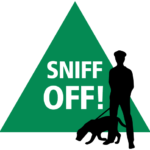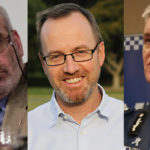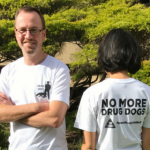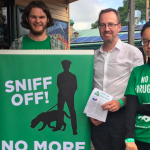Reining in Police Powers: Shoebridge on His Drug Dog and Strip Search Bill

Over the last two years, unlucky commuters at Sydney’s Central Station have been confronted with NSW police officers accompanied by drug dogs.
Deployed at peak hour, these officers have been equipped with screens, allowing them to strip search citizens if a dog indicates them.
Drug dogs have been found to make false positive indications anywhere from two-third to three-quarters of the time. This means no illicit drugs are found on the overwhelming majority of people who are searched, despite a dog indicating that they’re in their possession.
If a dog indicates a commuter on their way home, and the initial pat down produces nothing, two officers can order the individual to remove their clothes behind a screen. And it’s police policy that they can be ordered to squat and cough, bend over, lift testicles or breasts and part buttock checks.
Strip searches have recently become a prominent issue of contention. This is because their use is escalating dramatically. And what should be a measure of last resort has become routine.
Over the four year period ending in June 2018, the use of this invasive practice by NSW police rose by 47 percent.
Rolling back on overreach
Much of this wasn’t possible 20 years ago, and the rest that might have been legally permitted wasn’t being executed. And it’s not that wrongdoing has gotten any worse. Indeed, crime rates have been continuing to drop since the turn of the century.
That’s why NSW MLC David Shoebridge has just introduced his Law Enforcement (Powers and Responsibilities) Amendment (Drug Detection Dogs and Strip Searches) Bill 2020.
Nine months in the making, this legislation meticulously rolls back the police overreach of the last two decades.
During his second reading speech on the bill, Shoebridge remarked that right now, “an entire generation of young people”, when making a decision on whether to attend a music festival, have to factor in that they’ll be running “the risk of being strip searched and humiliated by police”.
“That was never part of the metric for me when I was going out as a young person,” the Greens justice person made clear, “and it should not be part of the metric for young people in this state.”
Prejudicially applied
While these powers can and do affect the entire community, the manner in which police consciously or unconsciously – but definitely biasedly – enforce these powers means that they disproportionately impact marginalised and vulnerable communities.
Numerous sets of stats tell the story.
A recent report outlines that a 16-year-old Aboriginal boy was taken into a regional police station, where an officer pulled down his shorts, lifted his shirt, then pressed down upon the naked boy’s shoulder forcing him to squat. This was over a stick of cannabis that was then on the police van floor.
Sydney Criminal Lawyers spoke to David Shoebridge about the amendments his bill makes to the NSW police powers legislation known as the LEPRA, so that in seven years citizens can’t look back to see that NSW police has conducted close to 2 million searches since 2020, as it has since 2013.
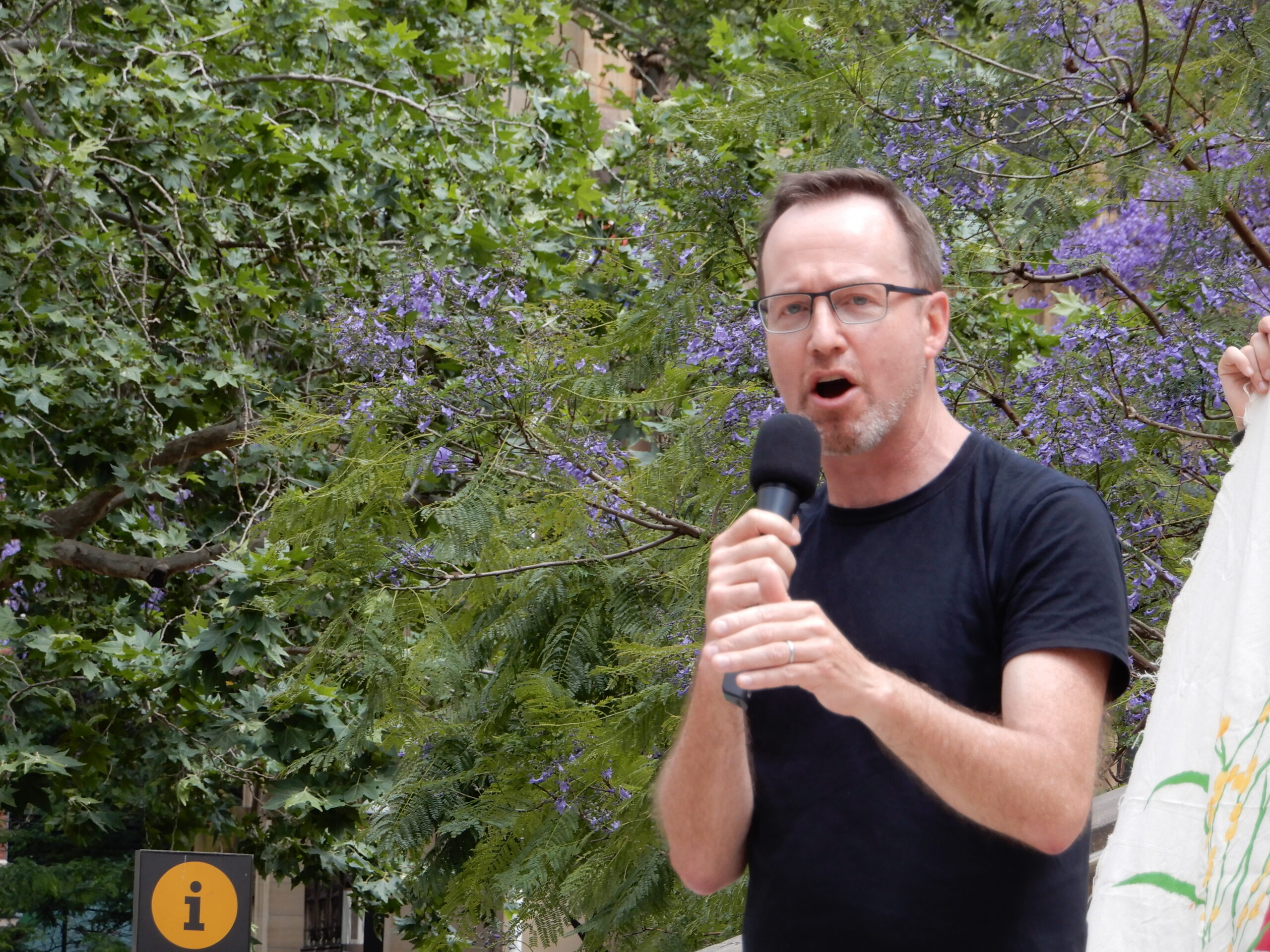
Firstly, you’ve just introduced the drug dog and strip search amendment bill into parliament. It amends the LEPRA to pull back on the “creep of police powers” that’s been occurring over the last decade.
So, David, how have NSW police powers been enhanced over the last ten years or so, whereby they constitute an overreach?
Since 2001, when the drug dog legislation was first introduced in NSW, but especially in the last ten years, we’ve seen this long march of increased police powers.
Drug dog operations can now operate without a warrant across the entire public transport system, through large parts of our major metropolitan cities and, of course, with warrants at music festivals up and down the state.
We’ve also seen a radical increase in the police use of search and strip search powers.
Data that we pulled together earlier this year showed that just between 2013 and the first part of 2020, NSW police conducted almost 2 million searches, an unhealthy proportion of which were strip searches.
In fact, they exceeded their target of 1.7 million searches in that period.
Taken together we have seen this substantial increase in police powers and we get repeated feedback from the public, especially from young people, people of colour and First Nations people, that they’re feeling this as they go about their business.
They’re being stopped, searched and intimidated. They need to be made safe from police.
As you mentioned, this state’s drug dog program commenced in 2001. It allows police to search people in public based on a dog indication. Your bill would remove the ability of police to conduct these types of searches without a warrant.
What sort of changes would this bring about?
We would hope that this would fundamentally change police practice, and greatly reduce the use of drug dogs.
We know that they get it wrong two-thirds or more of the time, and with these changes the police would need to satisfy a magistrate on each occasion before they could roll out a drug dog operation.
Before they got a warrant from a magistrate, they’d have to tell the truth about the false positives, and the magistrate would have to limit the operation of the drug dog searches to the smallest possible operation consistent with police objectives.
This wouldn’t completely abolish drug dog operations in NSW, but it would greatly curtail them.
Your bill amends the strip search sections of the LEPRA. These changes include ensuring that a strip search in the field is only carried out when there’s a serious risk of life or safety, and a senior police officer has to authorise it.
How would this change what’s going on out there in the community at present?
We closely followed the evidence before the coronial investigation, and the evidence before the Law Enforcement Conduct Commission.
What that makes clear is the majority of police that are ordering citizens to be strip searched have no idea about the existing checks and balances in the legislation and are routinely breaching the current controls.
The legislation itself allows for searches in very opaque circumstances. So, we wanted to do two things:
One, raise the bar so that strip searches can only be undertaken when there’s a very real risk to someone’s health and safety.
But also, to require the express authorisation of a senior police officer: someone who hopefully understands the law before anybody is strip searched again in NSW.
Your bill also raises the age limit for strip searches up from 10 years old to 16. And for 16- and 17-year-olds there must be exceptional circumstances for a strip search to be carried out.
David, why do we have laws that permit the strip searching of children as young as 10 years old?
When we talk with people in the community and explain how the law currently allows 10-year-olds to be strip searched by police just on suspicion – without even an express requirement that a parent be present – people are horrified.
It’s a fact that police are currently strip searching 10-, 11-, 12-, 13-, 14-year-old kids, just on the basis of suspicion and the opinion of a single police officer. We believe that needs to end.
We believe there should be a blanket prohibition on strip searching any child who hasn’t been arrested and charged with an offence if they’re aged under 16.
And when it comes to 16- and 17-year-olds, we believe there needs to be far greater protections put in place. That’s why we’re putting this legislation forward.
We believe if we tested the legislation in the community, we’d get a guaranteed majority.
The question is whether we can persuade a majority – especially Labor and the Coalition – to lift the law so it meets community standards.
The bill also abolishes the NSW police quota system for searches. This sees local area commands provided with annual targets for general searches.
What sort of effect is having armed officers out on the street being required to execute a certain amount of these discretionary powers having?
The very idea that we have armed police wandering our streets searching and strip searching people, not because of what they see in front of them, but to meet a quota that they’ve been given by their central command is appalling, and it’s anathema to anybody who believes in civil rights.
We firmly believe that quotas for searches and quotas for other overt uses of police discretionary powers inevitably produce abuses, and produce wide scale abuses, that’s why we include a provision in the bill to expressly prohibit quotas for these kinds of activities.
That will keep us safe from police. But it will also mean that good police are no longer out there having to flout the law to meet some quota given to them by management.
And lastly, David, most of these changes have happened under the watch of the Coalition. Obviously, the Greens are in support of pulling back on this police overreach.
But what’s the general attitude amongst other politicians to what’s going on? What sort of support is there in parliament for a reigning in of these powers?
What you find in this space is the support in the community is growing and growing. We’ve largely won over Middle Australia to the idea that there needs to be a rebalancing between civil liberties and police powers.
In fact, one-on-one conversations with my colleagues across the board in parliament shows that there’s significant support amongst individual MPs.
The problem in NSW politics is that the NSW Police Association and the NSW police seem to have an almost unbreakable power over the Liberal and National parties, and Labor in this state.
That is unhealthy for democracy. That relationship will be tested when we bring this bill on to a vote.




